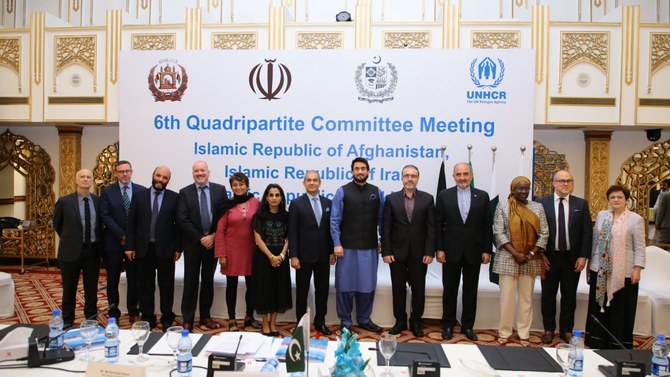ISLAMABAD: In talks held in Islamabad on Monday, representatives from Pakistan, Afghanistan, Iran and the United Nations High Commissioner for Refugees (UNHCR) called on the international community to further the cause of Afghan refugees and provide means to end future displacement.
The sixth edition of the Quadripartite Steering Committee meeting, held every year, saw the participation of Sayed Hussain Alemi Balkhi, Afghanistan’s Minister of Refugees and Repatriation (MoRR) and Shehryar Afridi, Pakistan’s Minister of States and Frontier Regions.
The Iranian side was represented by Hossein Zolfaghari, Deputy Minister of Interior for Security and Disciplinary Affairs, while Indrika Ratwatte, Director of the Regional Bureau for Asia and the Pacific, was speaking on behalf of the UNHCR.
The purpose of the meeting was to discuss the progress and challenges of the Solutions Strategy for Afghan Refugees (SSAR) which aims to support host countries by providing voluntary repatriation and sustainable reintegration.
“All parties reaffirmed their commitment to the SSAR and agreed to extend it until 2021...for identifying and implementing solutions for Afghan refugees,” the UNHCR said in a statement released on Monday.
All parties reiterated their support for joint advocacy and resource mobilization to support the strategy. “The participants urged development actors and other partners to provide adequate, tangible assistance for the SSAR,” the statement read.
The groups also called for joint efforts to create a conducive environment for a gradual, phased and voluntary return and sustainable reintegration of refugees in Afghanistan, in addition to aiding host communities, such as Iran and Pakistan, for the purpose.
Afridi, for his part, appealed to the international community to allocate more funds for the Refugee Affected and Hosting Areas (RAHA) program. He also urged for concerted efforts for development inside Afghanistan which could lure refugees to return home.
Recognizing Pakistan’s contribution in hosting Afghan refugees for the past 40 years, Balkhi said that due to a large number of migrants in Pakistan and Iran – and due to insecurity in Afghanistan – the SSAR has not been able to reach its goals.
“The need for SSAR continues to exist and I, therefore, call on the extension of the SSAR time frame,” he said.
Four-party meet in Islamabad seeks world’s attention for Afghan refugees
Four-party meet in Islamabad seeks world’s attention for Afghan refugees

- Representatives call for joint advocacy and resource mobilization
- Push for an extension of timeframe to realize goals set by group
Pakistan alleges India behind Balochistan attacks that killed 18 civilians, 15 troops

- Interior Minister Mohsin Naqvi accuses India of planning coordinated attacks across Balochistan this week
- Military says it killed 133 militants on Friday and Saturday in separate operations across various areas in Balochistan
ISLAMABAD: Pakistan’s Interior Minister Mohsin Naqvi this week alleged that India was behind the recent coordinated attacks in the southwestern Balochistan province that the military says killed 18 civilians and 15 troops, vowing to go after those responsible for the violence.
Pakistan’s military said on Saturday that it had killed 133 militants in the past two days in separate operations in Balochistan. The Inter-Services Public Relations (ISPR) said 41 militants were killed in operations in Panjgur and Harnai areas on Friday while 92 militants, including three suicide bombers, were killed on Saturday as security forces repelled coordinated attacks on civilians and law enforcement personnel in Quetta, Gwadar, Mastung, Nushki, Dalbandin, Kharan, Panjgur, Tump and Pasni areas.
It added that 18 civilians, including women, children, elderly people and laborers, were killed in the attacks in Gwadar and Kharan, while 15 security personnel were also killed during clearance operations and armed standoffs.
“India is behind these attacks,” Naqvi said during a joint press conference in Quetta late Saturday night with Balochistan Chief Minister Sarfraz Bugti. “I can tell you for sure that India planned these attacks along with these terrorists.”
He vowed that Islamabad would go after the militants who carried out these attacks and their “masters.”
“At this time it is very necessary that the world knows that the main country that is behind terrorism is India, who not only financially supports terrorists but also supports them in their planning and strategy as well,” the minister said.
In its statement on Saturday, the ISPR said the attacks were launched by “Indian sponsored Fitna al Hindustan,” a reference the military frequently uses for the separatist Balochistan Liberation Army (BLA) militant group.
The BLA also issued a statement on Saturday, saying it had launched what it called “Operation Herof 2.0,” claiming responsibility for attacks in multiple locations across Balochistan.
The military had said intelligence reports have confirmed the attacks were orchestrated and directed by militant leaders operating from outside Pakistan who were in direct communication with attackers during the assaults.
Pakistan has frequently blamed India for supporting militant attacks in Balochistan and its northwestern Khyber Pakhtunkhwa (KP) provinces, charges that New Delhi has vehemently denied.
Balochistan, which borders Iran and Afghanistan, has faced a decades-long insurgency by separatist militant groups, with Pakistani authorities frequently accusing foreign actors of backing the violence. India has repeatedly denied such allegations.










